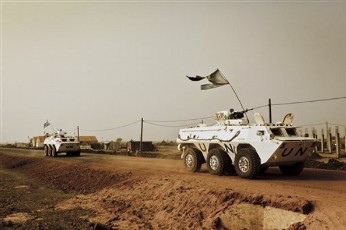S. Sudan appeals for global intervention over post-secession disputes
January 19, 2013 (JUBA) – South Sudan on Saturday appealed for the international community to intervene to break the ongoing deadlock over a number of issues which remain unresolved since the country broke away from neighbouring Sudan.
 The new nation came into being following a 2011 referendum provided for in a 2005 peace accord, which contained a self-determination clause allowing for the South to decide whether it should remain part of a united Sudan or break away during the six-year interim period.
The new nation came into being following a 2011 referendum provided for in a 2005 peace accord, which contained a self-determination clause allowing for the South to decide whether it should remain part of a united Sudan or break away during the six-year interim period.
Both the government of Sudan and the Sudan People’s Liberation Movement (SPLM) were signatories to the Comprehensive Peace Agreement (CPA), meant to end the decades-long civil war.
However, though it became an independent state, both South Sudan and the Khartoum government failed to implement the Comprehensive Peace Agreement (CPA) in full, with a number of contentious issues remaining unresolved.
The most notable of these include the status of contested-oil-producing-region Abyei, border demarcation, charges required for the new landlocked nation to be able to transport its crude oil to international markets through Sudanese territory and the status of nationals living in both countries and their assets.
At a news conference in the Ethiopian capital Addis Ababa, minister for justice and acting lead negotiator John Luk Jok announced the failure of the two sides to reach an understanding over the outstanding issues which have been the subject of discussions at a meeting of the Joint Political Security Mechanism (JPSM).
Jok blamed the breakdown in talks over “unjustifiable and persistent” demands by Sudan for “disengagement and disarmament” of the rebel Sudan People’s Liberation Army-North (SPLM-N) by the South Sudanese army (SPLA).
South Sudan has also rejected Sudanese demands to split membership at the Joint Abyei Area Legislative Council (AJOC) equally.
Under previous understandings South Sudan was to be granted 12 seats, with eight going to Sudan, from which 4 seats would be given to the Dinka Ngok members of Sudan’s governing National Congress Party (NCP) in the area.
Khartoum has rejected this as the indigenous Dinka Ngok would be expected to vote for Abyei to be transferred into South Sudan.
“We have not been able to move forward. Sudan continues to make illogical and unjustified demands,” said Jok.
“They are demanding disengagement of the SPLM-North with the SPLA and to conduct disarmament of their own rebels by another sovereign state. They want the Republic of South Sudan to move into Sudanese territory and disarm their rebels which is not logical.”
The elements that now make up the SPLM-North in South Kordofan and Blue Nile fought with the SPLA during Sudan’s protracted civil war and started fighting Khartoum government in 2011 after a disputed election in South Kordofan and as parts of the CPA specific to the Two Areas were not implemented before South Sudan’s independence.
Since the SPLM-N took up arms again Khartoum has continued to accuse its neighbour of backing their former colleagues despite Juba’s claims that it has cut off all ties with the group.
In a statement broadcast by the state-owned South Sudan Television (SSTV), Jok appealed for “quick, active and strong involvement” from the international community to resolve the dispute.
“The commitment of the government of South Sudan to resolving disputes over post secession issues with the Republic of Sudan has been demonstrated in the way it has responded to a number of resolutions and suggestions aiming at finding lasting solution,” he said.
Jok maintained that the “strategic objective” of the South Sudanese government is to reach an amicable solution through peaceful dialogue, saying Sudan’s reluctance to reach a solution had “placed obstacles” over the “charted path.”
“We believe there is nothing which the government of South Sudan has not done. We have done everything in our capacity and it is time for the African leaders and the international community to intervene and play critical role and responsibilities to halting dispute as soon as possible. The international community should intervene very, very urgently”, he said.
Meanwhile, Gabriel Changson Chang, a member of the negotiation team, says he often faces questions about the progress of negotiations between the two countries.
“I am often asked the question: ‘how long will these discussions last?’ My response to these questions has always been: ‘as long as it is necessary, as long as it is necessary to negotiate so that disputes between our two countries are resolved amicably, we will keep talking’”, he said.
Changson said it was high time the international community, particularly those with leverage, show an interest in helping the two sides end the long-running dispute by convincing Sudan to engage in negotiations in good faith and resume improved and strong bilateral relations.
“I think [the] time has come for a broader commitment by members of the international community – those with leverage and contacts – to convince Sudan [to] accept implementation of the proposal on Abyei and to engage in good faith in discussions on claimed and contested areas,” he said.
“It is imperative the international community speed up their roles to support the two sides [to] find [a] last[ing] settlement. The government of the Republic of South Sudan has always shown willingness to negotiate and move forward in resolving the dispute amicably.”
(ST)
